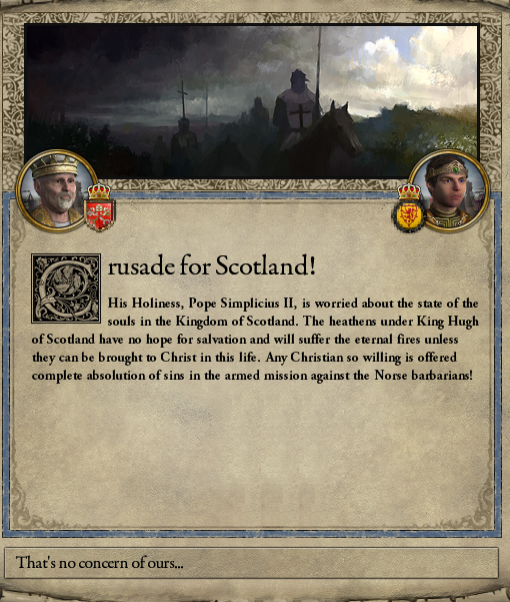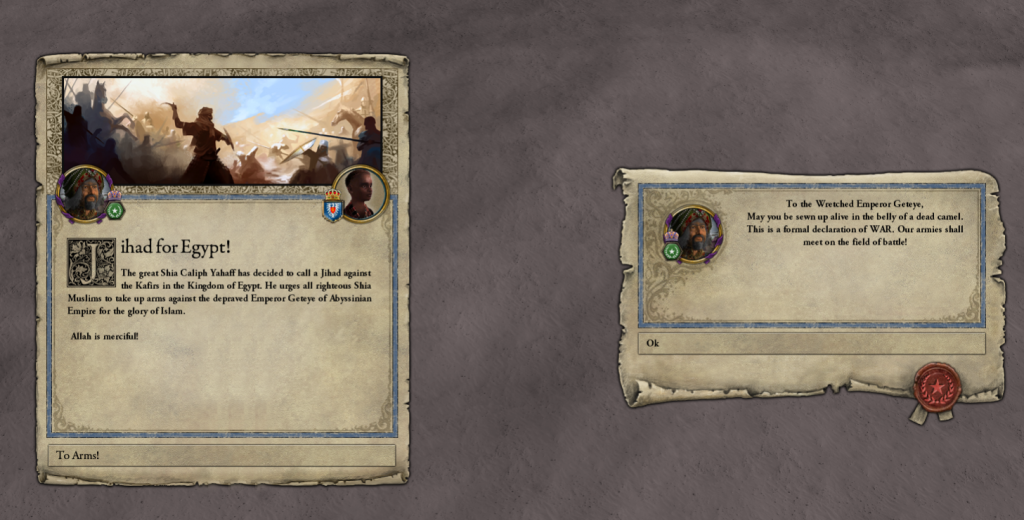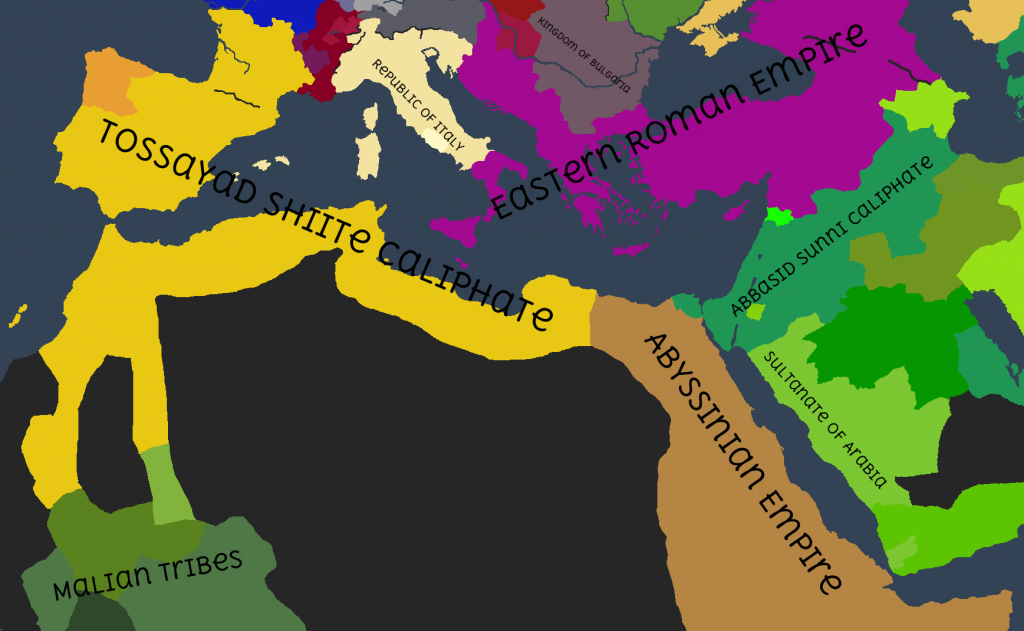CHAPTER SIXTEEN: PEACE TO A TROUBLED LAND
Emperor Anbasa Wedem II rose to the throne of a turbulent empire in turbulent times. Egypt was plagued by near-constant warfare, France succumbed to brutal Tossayad invasions, Britannia was embroiled in extreme religious chaos, Arabia faced a collapsing Abbasid Empire, and Germany was divided into countless feudal lords vying for dominance. Thus, it appeared in Anbasa II's best interest to bring an end to one of those conflicts: the Tossayad Jihad for Egypt. The task, however, was more difficult than it seemed. The Muslims crossed the Nile in a crucial but disastrous battle that saw the death of General Nizam. The assassin that killed Emperor Geteye was found, and after a period of torture, revealed that the Tossayad Caliph arranged the murder. This act of invisible war gave Emperor Anbasa Wedem II something he would not lose: a hatred for Islam. He had a certain sympathy for any people who he saw as 'oppressed' by Islam, especially the Jews. He saw his war against the Tossayad Caliph as a war against Islam itself, and he was determined to turn the war back in Abyssinia's favor.
This, of course, was easier said than done, as any attempts to break the Muslims army's back were met with failure time and time again. This process would last for ten more years, with sporadic Abyssinian attacks that merely halted the Muslim advance. Anbasa II, after hearing of a particularly troubling defeat where no Abyssinians returned from the battlefield, ordered that any remaining armies withdraw from Egypt and prepare to face the Muslim forces further south. The decision was made at the expense of a great deal of honor, as this was deemed by many in Gondar to be the first step towards admitting defeat, as fate that Anbasa II promised would not happen. However, Emperor Anbasa II had another plan. He hoped that by retreating south into the hilly countryside of Abyssinia, the Muslims would follow, leading to an encounter where victory would be assured.
The plan worked, and by January of 978, scouts would report a large Tossayad army of 13,000 heading towards the 7,000 Abyssinian men. The Battle of Suakin would commence on February 7th. The Muslim general, arrogant from many previous victories over Abyssinia and his numerical advantage, boldly marched his men towards the entrenched Abyssinian army on the hillsides not far away. This arrogance allowed the numerous Abyssinian archers to rain arrows upon the Andalusian forces. Almost half the army was destroyed before it even reached the Abyssinians. The ensuing melee was quick, resulting in an overwhelming Abyssinian victory. This inspired a feeling not seen in the Abyssinian soldiers in a long time: hope. The battle scattered the majority of the Tossayad forces in Abyssinian lands, and the Abyssinian army was quick to capitalize on the opportunity. They swept through occupied territory, liberating the Egyptians that had lived under Muslim rule for years. The Tossayads were not able to send reinforcements to the region until it was already too late. Egypt had been liberated, and the Tossayads found themselves in a war that was quickly becoming unpopular. By May of that year, diplomatic talks opened up to arrange a peace deal.*
Agreement I
The Tossayad Caliphate will renounce any claim on Abyssinian-held Egypt.
Agreement II
The Tossayad Caliphate will cede all land north of the Pyrenees Mountains to the Kingdom of France.
Agreement III
The Tossayad Caliphate will not attack the Abyssinian Empire for at least ten years.
The Tossayad Caliph was eager to find a quick solution to the growing tensions in his French holdings, and the peace deal gave him a way to solve the problem. However, this caused a great deal of uproar among the lords of the Caliphate, as they viewed this as an act of ultimate weakness on the Caliph's part. The Caliph's own brother even disapproved of the peace agreements, stating that "My brother has discredited one of Islam's greatest achievements. We, took our revenge for the Battle of the Palace of Martyrs (battle of Tours), but my brother has reversed it, demolishing any chance of a Muslim domination of Europe. He is unfit for rule, and this 'peace' is a travesty."
The peace deal was much better received in the Abyssinian Empire, where Emperor Anbasa Wedem II was praised for bringing an end to a conflict that saw thousands of soldiers on either side killed. He returned to Gondar to meet a crows of joyous people, praising his name as he traveled through the streets of Gondar. The celebratory chants ringed through the air, creating a chorus of acclaim for the Solomonid Dynasty and the Abyssinian Empire. Emperor Anbasa Wedem II become well-known and well respected in Abyssinia.
After the war, Anbasa II began reopening up talks with the Byzantine Empire. A marriage was arranged between Mirask, Anbasa II's aunt, and Basileus Eirenaios II of the Byzantine Empire. This would open the gates for future amiable diplomatic negotiations between Abyssinia And Byzantium. The event was celebrated in both Gondar and Constantinople. This would mark the beginning of a true peace in Abyssinia. Geteye planted the seeds of peace, and Anbasa II nurtured them.
The port of Massawa was, as any other day, busy. Sailors bustled to get to their ships while also loading and unloading various cargo, which consisted of anything from exotic spices to elegant porcelain. Captains and shipowners also made their way through the crowds, managing finances and other more administrative details of shipping. Massawa was a large port for merchants from lands so far away their people looked alien and their wares were mystically lavish. Anbasa Wedem II had a certain affinity for Massawa, as well as trade in the Indian Ocean. There, he received bits and pieces of information about kingdoms and empires oceans apart, but they still actively engaged in trade with each other. Anbasa Wedem II once saw traders that claimed to have come from a mysterious and powerful faraway empire called 'China.' These merchants stated that it was home to an emperor far more powerful than anybody in the west. They said that this empire of 'China' was a land of bounty and surplus, where even the poorest dined on quail. Emperor Anbasa Wedem II was intrigued, to say the least. However, today, he was content just enjoying watching the ships pull into port. This peaceful morning breeze, coupled with the sounds of a busy harbor, seemed blissful to Anbasa II. The calm would soon be interrupted by a heavily accented voice.
"Anbasa Wedem II."
Anbasa II turned to face the speaker. His face was lined with wrinkles that showed wisdom as well as age. His skin was of a color that Anbasa II associated with the strange merchants who worshiped many Gods in extravagant temples. However, his clothing was much different. He wore a large green turban lined with jewels that gleamed in the sunlight. His robe was black, outlined with mysterious patters etched in gold. This too was affected by the sun's gaze.
"Who has the honor of addressing me in person?"
"My name is Surajpal. Come, follow me. My ship is over there."
Anbasa II was uneasy. This strange man wore robes that reeked of wealth, and he had the strange bravery to address the emperor uninvited. However, Emperor Anbasa II was curious, and his curiosity soon gripped him with an iron fist, and he found himself following Surajpal to his ship. It was nothing extraordinary, much unlike its owner. However, there seemed to be no crew on-board. Anbasa II followed Surajpal aboard, and the two walked over to a rather plain-looking chest.
"Open it, Anbasa Wedem II."
He cautiously opened the box, carefully eyeing his surroundings as to avoid being caught off-guard. However, the contents of the chest demanded attention. Inside the chest were several fortunes' worth of gold. Gold bars, gold coins, gold jewels, gold trinkets. Anbasa Wedem II couldn't help but gawk at the treasures inside. However, he soon regained his composure and turned to look back at the strange man who called himself Surajpal. However, he was no longer there. In fact, Anbasa Wedem II couldn't see him anywhere. He asked himself if he was dreaming, as no man could run as quickly and as stealthily as what was just seen here. Emperor Anbasa Wedem II ordered for the ship, and its precious cargo, to be taken to a small dock the emperor used for private affairs. It was a short trip there, as it stood sheltered by a grotto not far from Massawa. From there, the gold would be transported to Gondar. The ship, after a thorough inspection, would be destroyed. Anbasa Wedem II had a feeling that this was not the last time he would see Surajpal, and that the delivery of gold was not his primary motivation.
*Of course, I used console commands to create the peace deal.





